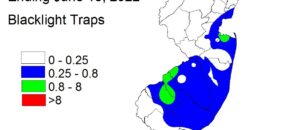Cercospora leaf spot (CLS), caused by Cercospora beticola, is an important and emerging disease in beet and swiss chard production in New Jersey. Efforts to control this disease has become more difficult in the past few years in some areas of southern New Jersey.
Continue reading...Sign Up By June 30 to Receive the 2022 Census of Agriculture
Agricultural producers who did not receive the 2017 Census of Agriculture and do not receive other USDA surveys or censuses have until June 30 to sign up to receive the 2022 Census of Agriculture. USDA’s National Agricultural Statistics Service (NASS) will mail ag census survey codes for responding securely online to every known U.S. producer […]
Continue reading...Upcoming Parasite Management Webinar for Sheep and Goat Producers
“The FDA will require a valid veterinary-client-patient relationship (VCPR) by June 2023 to obtain a prescription, purchase injectable antibiotics and retain future access to antibiotics. In 2017, the Veterinary Feed Directive required prescriptions for antibiotics in animal feed and drinking water.” “The University of Minnesota (UMN) and North Dakota State University (NDSU) Extension will […]
Continue reading...Cucurbit powdery mildew control in 2023
Cucurbit powdery mildew (CPM), caused by Podosphaera xanthii, is one the most important diseases of cucurbit crops throughout the world. The pathogen is an obligate parasite, just like cucurbit downy mildew, meaning it needs a living host in order to survive. In northern regions that have a killing frost in the fall the pathogen will […]
Continue reading...NJ Bag Ban Update Impacting Direct Market Farms
We have continued to receive questions and comments about the NJ Bag Ban and its impact on farm markets. These questions and comments have been specifically focused on the fact that the ban does not clearly state what types of plastic bags can be used to bag exempted items, including produce. We have received mixed […]
Continue reading...Vegetable IPM Update 6/15/22

Sweet Corn Low numbers of European corn borer (ECB) moths continue to be captured, and feeding in whorl stage corn is rising. The highest adult activity is currently Hunterdon County (see map below at right). ECB injury over 60% of plants infested has been found in southern Hunterdon County this week. While this level of […]
Continue reading...